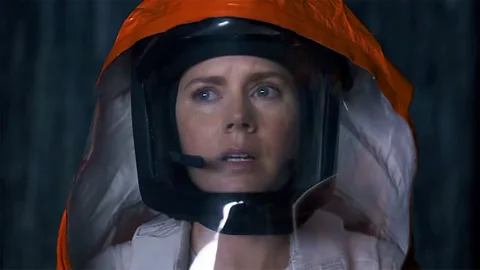Arrival is the smartest big-budget sci-fi film in years

 Sony Pictures International
Sony Pictures InternationalIt’s a long time since a commercial science-fiction movie has addressed itself so directly to big ideas. We should be glad for Arrival, writes Sam Adams.
Denis Villeneuve specialises in films with grand themes and hollow centres, a builder of splendid edifices in which nobody is home. His last films, Prisoners and Sicario, were logy with self-importance; peel back their trumped-up moral quandaries and they verge on well-accomplished fraud. But with Arrival, Villeneuve finally finds a subject, and a script, whose magnitude matches the weight he assigns to it. All it took was an alien species' appearance on Earth.
The story of a talented linguist asked to decipher the creatures' low, nearly subsonic rumblings is also the story of Louise Banks (Amy Adams) coming to with her daughter's death. (No spoiler complaints, please: we find out in the first few minutes.) The creatures, dubbed heptapods because of their seven appendages, appear one day in grey, oblong ships that look like massive pebbles, hovering improbably above a field in Montana and elsewhere around the world – 12 ships in all, the apostles to a messiah who may never arrive. Louise's memories of her daughter appear just as inexplicably, rupturing the movie's equally grey surface at moments that surprise even her.
The heptapods arrive without warning and without explanation; they seem to have no agenda they're able to express, or that we understand. But the mere fact of their existence turns the characters’ world on its side. Louise is called in by the US government because previous attempts to communicate have been thwarted by the tremendous difference between English and the aliens’ language, which goes all the way down to the root. They don't understand the world in of subjects and verbs, actors and objects. Understanding it means challenging not only what we think we know but how we come to know it.
Heavy stuff, right? Eric Heisserer's script dilutes or omits some of the more complex notions in Ted Chiang's short story, The Story of Your Life, but big-budget sci-fi of ideas is so rare that what survives the transition is plenty. Although he's clearly working from Steven Spielberg's template rather than forging his own, Villeneuve develops a clear and resonant conflict between those who want to study the creatures for knowledge's sake and those whose main concern is a potential alien invasion – or, just as bad, whatever advantage working with the aliens might give another of Earth's military powers. The ships are scattered around the globe apparently at random: the best explanation anyone can come up with is that the countries in which they've landed all gave Sheena Easton a hit single in the 1980s (a rare moment of levity in a movie that otherwise has little use for it).
Louise is ed on Team Knowledge by Ian Donnelly (Jeremy Renner), a theoretical physicist who tries to breach the language gap with science instead of words. But there again, their efforts are stymied. Concepts that seem elementary to us are complex to the heptapods, and vice-versa; it's as if they started reading the encyclopedia at Z. Meanwhile, the world grows increasingly nervous: markets roil, people riot, and the world's governments come to doubt their initial commitment to sharing information. The Chinese military, represented mainly by Tzi Ma's General Shang, serve as a kind of all-purpose bogeyman, but that's as much in the minds of the increasingly jumpy US government officials as it may be in reality. There's a not especially subtle idea lurking just beneath the surface: how can we begin to know another species when we don't know our own?
Through a glass darkly
The heptapods' speech turns out to be indecipherable; one cinema-shaking groan sounds the same as another. But Louise is able to get a handle on their writing, which takes the form of fluid, inky circles that seems as much a living thing as the heptapods themselves. Louise, Ian and the anonymous gun-toting flunkies who accompany them, never make physical with the aliens: their encounters take place inside the ships, where they face a translucent rectangle that might be a pane of glass or an ultra-high-definition screen, through which the heptapods' bodies are partially visible through what looks like billowing fog. (Villeneuve is working for the first time with cinematographer Bradford Young, who emphasises the grit and grime in the movie's CGI tableaux.) The closer Louise comes to understanding their language, the more she begins to think as they do, and the more memories of her daughter seem to come rushing back with greater force and clarity.
As Louise delves further into the heptapods' language, the way she sees the world itself begins to change (to say more would be telling), but Adams turns her revelations inward rather than out. For all Arrival owes to Steven Spielberg, she’s the inverse of Richard Dreyfus’s raving evangelist in Close Encounters of the Third Kind, a prophet biding her time until humanity is ready to know what she knows. She finds an unexpectedly receptive ally in Forest Whitaker’s American colonel, although the unplaceable accent he adopts for the role seems designed to test the skills of even the world’s most proficient linguist.
Arrival's sci-fi goes softest in its final phase, which counts on our eyes being flooded with tears so we don’t see the plot’s gears grinding. But it's the first of Villeneuve's movies in which that sentimentality feels earned, and even welcome.
★★★★☆
If you would like to comment on this story or anything else you have seen on BBC Culture, head over to our Facebook page or message us on Twitter.
And if you liked this story, sign up for the weekly bbc.com features newsletter, called “If You Only Read 6 Things This Week”. A handpicked selection of stories from BBC Future, Earth, Culture, Capital, Travel and Autos, delivered to your inbox every Friday.
